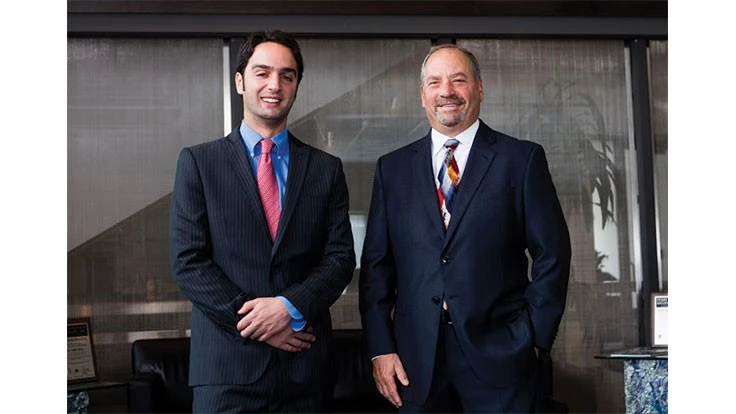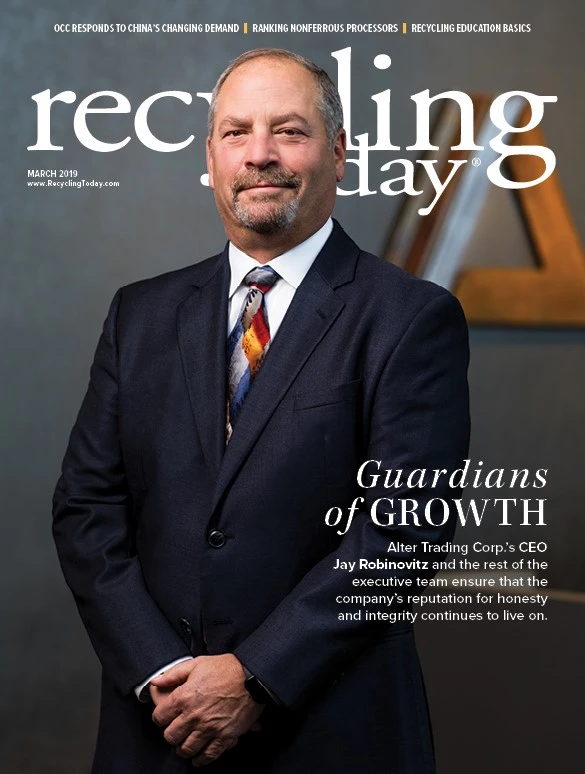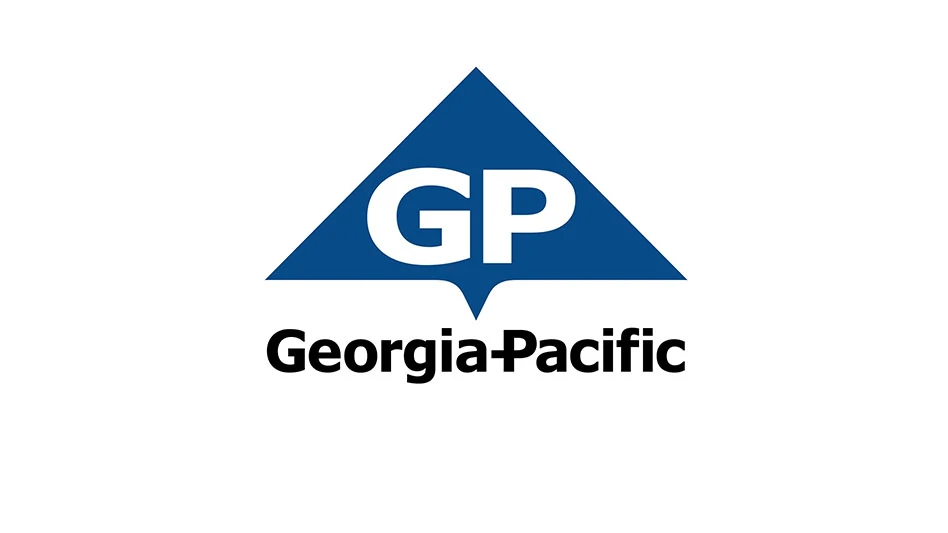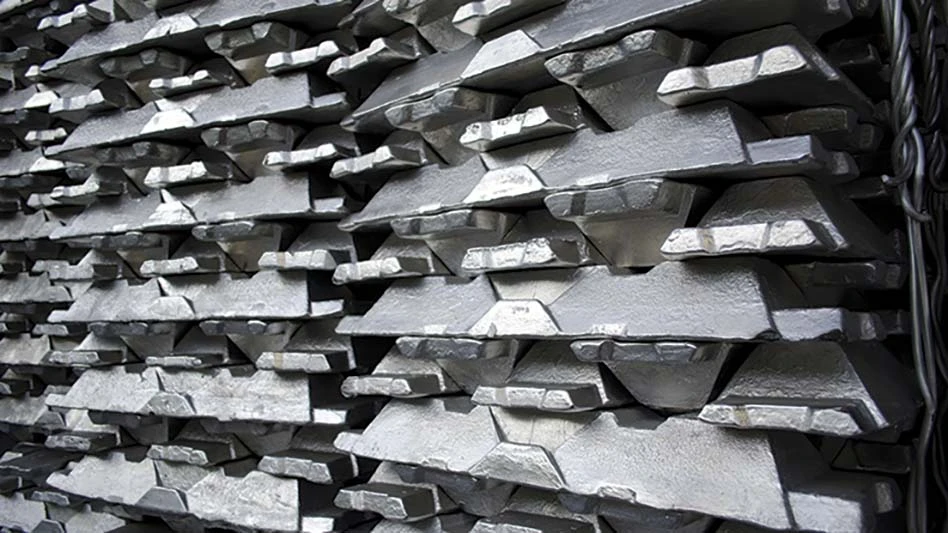
Jason Winkeler Photography

Leading a company that has more than 100 years of history behind it can make a person anxious, particularly if that person is not related to the family who owns the business. Just ask Jay Robinovitz, chief executive officer of Alter Trading Corp., headquartered in St. Louis.
“My biggest fear: jeopardizing the reputation of honesty and integrity that the Alter company has maintained for more than a hundred years,” he says.
Robinovitz doesn’t have to shoulder that burden alone, however. Alter has an executive team of professionals “that happens to include some very capable family members,” he says. “We are a family business with a truly diverse and professional management team. Although there is a very strong premise of family leadership, in the future, the family and the board has ensured that if that doesn’t happen, the business leadership is solid and sustainable.”
Robinovitz joined the company in September 2009 as senior vice president and chief officer of operations.
“As long as we stay disciplined and keep our inventory moving and our operational costs where they need to be, then we just work through the ever-changing markets as efficiently as possible.” – Jay Robinovitz, Alter Trading Corp. CEO
“I’m just a kid from a small scrap yard in Massachusetts,” he says with modesty. “I have spent my career working for large family-owned or -operated scrap companies and have learned to love the industry, the people, the challenges and the opportunities.”
Prior to joining Alter, Robinovitz worked in various roles for Schnitzer Steel Industries, Portland, Oregon, including vice president of business development and major capital investments, vice president and chief operating officer of the company’s auto parts division and vice president of Northwest operations. He also served as general manager of the ferrous division of Aerospace Metals Inc., Hartford, Connecticut.
Robinovitz says his role at Alter involves helping “to facilitate growth and to work with the Goldstein family to design and implement a long-term growth and succession plan for the scrap business.”
He says that as Senior Vice President of Operations Michael Goldstein, the fifth generation of the family to be involved in the business, takes on more operating responsibility for the company, “it looks like at some point in the future, the reins may be in the hands of a family member once again.”
Robinovitz continues, “For now, we have a strong professional staff that drives solid growth for shareholders.”
He adds that in continuing to put a long-term succession plan in place, Alter recently announced changes to its leadership. Robinovitz retained the title of CEO and board member, allowing Chief Financial Officer Tim Oliver to take the additional title of president. Jack Grundfest, previously the CEO of Tenenbaum Recycling Group (TRG), was named to the newly created role of
“The first question is, ‘Am I retiring,’ and the answer is, ‘No,’” Robinovitz says. “It’s just the continuation of a long development process that will allow me to focus on more outward facing issues and opportunities that will help sustain our growth.”
Family at the core
Alter’s ownership currently lies in the hands of the Goldstein family, but that wasn’t always the case.
Alter’s history dates back to 1898. While the names of the founders of that original company have been lost to time, Harry Alter began working for the firm in 1900. His brother, Morris, also joined the business in 1905. By 1908, the brothers were the joint proprietors of Davenport Iron & Metal Co. in Davenport, Iowa, and they remained in business together for 15 years before Morris and his son, Frank, bought Harry out of the company in 1920, forming Davenport Iron & Machinery. The company would first use the Alter name in 1935.
As Bernard “Bernie” Goldstein writes in Navigating the century: A personal account of Alter Company’s First Hundred Years, which was first published in 1998, 11 years before Bernie’s death, it was Frank “more than anything, who was responsible for building the company into significance.”
He continues, “Even if he didn’t found today’s company, he gave it its character, its ambition for growth, its taste for new technology and its unbending integrity.”
Bernie married into the business in 1949, when he wed Irene (who preferred to go by Renee), one of Frank’s two daughters. He joined the company full time in 1951.
Frank eventually gave Bernie and Renee a 45 percent stake in the company and an equal stake to his other son-in-law, Arant Sherman, and daughter Anita. The business was eventually split after divergent ideas about how to manage the company became too great to ignore. Arant and Anita took the nickel alloy business, Alter’s existing nonferrous scrap trade and the steel warehousing business, while Frank and Bernie retained the scrap yard and barge business.
Bernie was elected secretary/treasurer of the company in 1951 and eventually rose to president. Frank remained involved in the business until
Bernie led Alter until
Robert “Rob” Goldstein, one of Bernard’s three sons, replaced Smith as the president of Alter Trading in 1989.
Rob served as president of the company until 2012, at which point Robinovitz was promoted from senior vice president and chief officer of operations to president and chief operating officer. Jan. 1, 2018, he took on the dual roles of president and chief executive officer.
Alter today
Despite the company’s name, Robinovitz says, “The majority of tons sold both in ferrous and nonferrous are internally collected and processed and shipped from Alter-owned and -operated facilities.”
He adds that Alter’s brokerage business allows the company to meet the scrap needs of its largest mill customers and provides real-time information on the global demand for metals.
Alter processes approximately 4 million tons of ferrous scrap annually and trades an additional 1.5 million tons, Robinovitz says. The company handles 600 million pounds of nonferrous scrap per year.
“We sell into a global market, and our products fill the needs of manufacturers around the world every day,” Robinovitz says. “Our ferrous customers tend to be domestic, while more of our nonferrous materials have historically gone overseas, though that balance is changing.”
Alter operates roughly 70 facilities, which include 16 automobile shredders, seven nonferrous recovery systems, an advanced recovery plant for shredded nonferrous metals, two self-service auto parts facilities
“It is a very mature industry, and new technology becomes ubiquitous very quickly,” Robinovitz says. “What allows you to differentiate yourself in our industry is your unwavering commitment to be a good neighbor in the communities you operate in and to prioritize the wellbeing and fulfillment of your employees.”
Robinovitz says employee safety and wellness are his most important personal mission. “Over the years, I have fought hard to make our industry and our company a safer place to work.” That mission is one of Alter’s core commitments.
He continues, “In the past several years in trying to provide the best health care for all of our employees, we also focused on making our employees healthier. It pays great dividends to invest in health screening, health-based activities, preventive measures and incentives for making healthy choices. It works for everyone and builds
He says Alter’s employees help to set the company apart. “Our employees are honest, entrepreneurial and passionate. We challenge them to improve continuously, and then we reward them when we are successful.”
The company is slow to hire, with Robinovitz saying Alter tries to find individuals who are the right fit. “It’s not easy getting onto the Alter team,” he says, “but, once you’re part of Alter, we are there for one another and in it for the long haul.”
Robinovitz says Alter has emphasized employee training and development. “It has become necessary because the days of generation after generation running the scrap yard is fading. Many of the facilities that we have acquired have been [sold] because there was no natural succession plan and families were left with no choice but to exit the business,” he adds.
“And I can’t say enough about all of the great folks that have joined us as part of our acquisitions,” Robinovitz says. “We have gained so many solid leaders and have learned so much from them that we get stronger with every acquisition we complete.”
Organic and inorganic growth
Growth through acquisition is an important factor in Alter’s story. The company has added 55 locations since 1998, primarily by purchasing existing family-owned scrap companies. Alter’s most recent purchase was of 100-plus-year-old TRG of Little Rock, Arkansas, in late 2018. Behr Iron & Metal, Rockford, Illinois, was purchased in 2016, while Alter bought Miller Compressing in Milwaukee in 2012, CMI Group in Nebraska in 2013 and various local operations over the year that it has merged into its regional footprint.
Other companies that Alter has purchased over that 20-year period include Wausau Scrap and Recycling Corp., Wausau, Wisconsin; All Metals Recycling, Ottumwa, Iowa; and Reliable Recycling of Wisconsin.
“Buying facilities that have been in business for more than 100 years says they have a proud place in their communities, and, as the buyer, we need to figure out how to live up to that set of standards,” Robinovitz says.
He adds that Alter is always on the lookout for acquisition opportunities. “What do we look for? Great people,
“We never stop looking for the next opportunity to grow, and that is done in a variety of ways. We look for voids in a market or territory, or we partner with a consumer with unique needs. We are always evaluating new technologies that can extract more value and, most importantly, we never stop looking to add smart people with great ideas to the organization. Interacting with and hiring individuals with intellectual curiosity is what makes my job fun.”
Alter invested hundreds of millions of dollars to grow its footprint and capabilities over the last seven years, Robinovitz says. “Those investments have allowed us to come out of the most recent down- cycle far better off than when we entered it. When times get tough, we focus on two things: our costs per unit of output and our inventory turns.”

A focused approach
“Markets do what markets do,” Robinovitz says. “As long as we stay disciplined and keep our inventory moving and our operational costs where they need to be, then we just work through the ever-changing markets as efficiently as possible. We do not speculate on metals prices. All you need is a computer to do that. We try to buy, process and sell metals all in the same cycle. That said, we are not immune to the volatility in the markets, and if things slow significantly enough and volume stops, we have to adjust like anyone else.”
He adds, “The best thing we can do is be ready for change, diversify the geography of our customer base and keep growing. In times of significant uncertainty and disruption, size and financial strength matter.”
China’s reduced buying of nonferrous metals is one such change the domestic scrap processing industry has been dealing with recently. “Material has sought new homes and in much more diverse locations around the globe,” Robinovitz says. “That diversity makes for stronger economies around the world and less concentration on Southeast Asia, particularly China,” which he says adds flexibility to the marketplace.
Alter started planning for changes in China following the country’s introduction of Operation Green Fence in 2013 by installing a heavy media plant in Davenport in 2015 to further process shredded nonferrous scrap that has already been processed by its seven shredded nonferrous scrap recovery systems. “We continued to trade with China, as we do today, but we diversified our ability to serve new markets and be prepared in the event for a shift away from that market,” Robinovitz says. “In the end, it is about flexibility and a broad consumer base for our finished goods that let us move through all markets with confidence.”
While Alter still sells some
Alter has invested significantly in its existing facilities, nonferrous recovery technology
Robinovitz and the leadership team at Alter are counting on this approach to keep Alter Trading Corp. around for

Explore the March 2019 Issue
Check out more from this issue and find your next story to read.
Latest from Recycling Today
- Cyclic Materials to build rare earth recycling facility in Mesa, Arizona
- Ecobat’s Seculene product earns recognition for flame-retardant properties
- IWS' newest MRF is part of its broader strategy to modernize waste management infrastructure
- PCA reports profitable Q1
- British Steel mill subject of UK government intervention
- NRC seeks speakers for October event
- LME identifies Hong Kong warehouses
- Greenville, Mississippi, launches aluminum can recycling program





